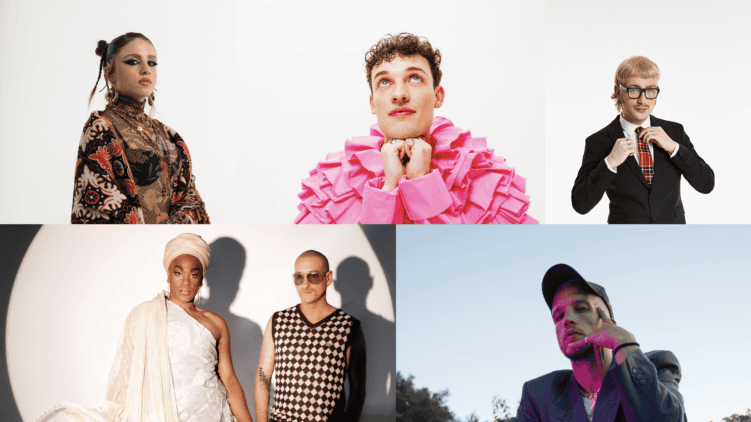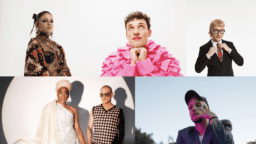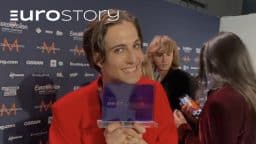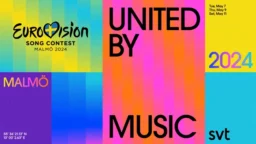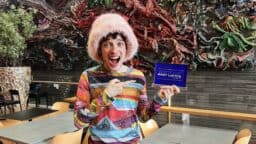To highlight the art of writing song lyrics, for the 8th time Eurostory hands out the Eurostory Best Lyrics Award – an award for the best song lyrics of this year’s Eurovision songs. Previous awards were won by Ukraine (2016), France (2017, 2018), Italy (2019, 2021, 2022) and Austria (2023).
Today we announce the five nominees for 2024. As in previous years the winner will be chosen by a large international expert jury, and also by you, visitors of our website! You can vote now!
The nominees
These are the nominees for the Eurostory Best Lyrics Award 2024:
- Australia: One blood (One milkali), Electric Fields, lyrics: Michael Ross, Zaachariaha Fielding
- Croatia: Rim tim tagi dim, Baby Lasagna, lyrics: Marko Purišić
- Italy: La noia, Angelina Mango, lyrics: Angelina Mango, Madame
- The Netherlands: Europapa, Joost Klein, lyrics: Joost Klein, Maradonnie, Tim Haars
- Switzerland: The code, Nemo, lyrics: Benjamin Alasu, Lasse Mydtsian Nymann, Linda Dale, Nemo Mettler
Below you find the jury reports.
Australia: One blood (One milkali) (Michael Ross, Zaachariaha Fielding)
Jury report:
If we had to describe the song ‘One milkali (One blood)’ by music duo Electric Fields in one word, it would be: spiritual. Singer Zaachariaha Fielding and producer Michael Ross invite us to view the planet as we know it, with all the directly visible and tangible aspects, on a different scale. Smaller. But also larger. On an atomic scale, but also on a cosmic scale. In molecular systems and nebulas. ‘To see,’ they sing, ‘[that] we don’t own the universe.’
‘One milkali (One blood)’ is an anti-ego song containing one of the most self-destructive lines in Eurovision history: ‘My soul slips away from its title.’ In that lies the profoundly unifying message of the song, with a direct link to love, because even kissing lips fall apart, ‘we kiss and matter dismantles.’ It’s a text of awareness about how immensely small we are as humans, ‘one of them billion-billions,’ and yet immensely significant. Because even when we are not (consciously) present, when we dream, ‘the atoms are awake.’ Electric Fields hands over the stage, the song title, and the core idea of the song to Yankunytiatjara, one of the oldest Aboriginal languages in Australia. Symbolic and poignant.
Croatia: Rim tim tagi dim, Baby Lasagna, lyrics: Marko Purišić
Jury report:
At first glance, ‘Rim tim tagi dim’ seems like a title in the category of ‘Ding-a-dong’ and ‘Diggiloo-diggiley,’ and indeed, those sounds seemingly mean nothing special. But then the verses. ‘I’m a big boy now, I’m ready to leave, ciao, mama, ciao’ – thus opens Baby Lasagna’s tale. It’s about a boy leaving his small Croatian village, perhaps Umag, where Marko Purišić, the real name of the singer, comes from. More people leave Croatia than those who come in. Especially young people move abroad. Purišić talks about it with equally humorous and painful observations. The lines ‘I’m leaving now and I sold my cow’ and ‘Gonna miss you all, but mostly the cat’ are funny, but bitterness sets in with: ‘There’s no going back, my presence fades to black.’ It gets entirely serious when that line rhymes with ‘anxiety attacks,’ and right after, we hear ‘Rim tim tagi dim’ again, making you wonder if the title just represents the sound of those panic attacks in his head. Fortunately, further down the line, the cat is mentioned again: ‘Meow, cat, please meow back’ – and that’s the most humorous way to express what every departing person hopes deep down: that those left behind will meow back to you.
Italy: La noia, Angelina Mango, lyrics: Angelina Mango, Madame
Jury report:
Angelina Mango sings ‘La noia,’ or ‘The boredom.’ She sings from the perspective of a girl in Italian society, a girl who doesn’t choose for herself but is lived through by others, especially by patriarchy, the men who don’t give her ‘pearls of wisdom’ but ‘colored beads,’ for ‘the little girls with traumas.’ The men do the business and write the lyrics, while she (Angelina) blindly signs the contracts. Because she doesn’t have much else to contribute. In a sarcastic manner, she portrays her lyricist as a character. ‘I don’t want to bore you,’ he says, ‘but here’s a love song, and someone has to sing it.’ The lyrics also contain references to the Bible, as she talks about a crown of thorns that she’s given but almost cherishes herself. Because those who suffer at least experience something. Just like when you dance the cumbia, the originally Colombian dance genre central in the chorus. About that, she sings: ‘If I risk stumbling, at least the boredom stops.’ In a wonderfully infectious, sarcastically sung song, that’s mainly what the singer does: wait until finally something happens.
The Netherlands: Europapa, Joost Klein, lyrics: Joost Klein, Maradonnie, Tim Haars
Jury report:
The essence of the Europapa text springs forth from its title. It serves as a summary of all the elements within the song. Firstly, the use of ‘Euro’ – throughout the verses, Joost Klein plays with cities and countries (friends in France, ‘trein’ to ‘Berlijn’, ‘benen’ to ‘Wenen’). Secondly, ‘papa’ serves as onomatopoeia: within those syllables, the choppy dancing is already hinted at. And thirdly, ‘papa’ as in ‘father’. Amidst all the celebratory lines, Klein makes it clear that this might be his ultimate attempt to honor his parents, particularly his father, who passed away early. The line ‘Ik heb geen visum nodig om bij je te zijn’ (‘I don’t need a visa to be with you’) takes on a whole different meaning when read in that context. And ‘Ik ben echt alles kwijt, behalve de tijd’ (‘I’ve lost everything, except for time’) hits hard upon deeper reflection, much like the reference to Stromae with his song Papaoutai (which literally means: ‘Dad, where are you?’). And then there’s, of course, the poignant conclusion of the song: ‘I miss you every day, is what I whisper secretly. See, dad? I did listen to you after all.’
Switzerland: The code, Nemo, lyrics: Benjamin Alasu, Lasse Mydtsian Nymann, Linda Dale, Nemo Mettler
Jury report:
Nemo sings about ‘the code’. That brings to mind cryptography, something you have to decipher. But for Nemo, uncovering what lies behind the code has much more to do with something larger: the limited choices society imposes on them as a genderqueer person. You must be zero or one – computer language for one or the other. In other words: binary. In other words: male or female. Nemo beautifully articulates this in the bridge of their song: ‘Somewhere between the 0’s and 1’s I’ve found my kingdom come.’
That last word is an important nuance: their ‘kingdom come,’ not just their ‘kingdom.’ The expectation of a kingdom is thus found, not yet that complete kingdom (articulated by these lines: ‘Let me taste the lows and highs, let me feel that burning fright’). The beauty of this song about non-binary identity is that both the melody and the lyrics are not apologetic, not accusatory, but simply euphoric. And a line like ‘I broke the code like ammonites, I gave it time’ is, of course, a brilliant, promising way to describe this life-changing quest. Moreover, how often have ammonites been mentioned in a Eurovision song?
Teya & Salena in 2023: ‘Songwriters are so important!’
Teya and Salena, co-lyricists and performers of Who the hell is Edgar? and winner of the Eurostory Best Lyrics Award last year, thanked the jury and the public voters. ‘We are completely over the moon. For us, this shows how important good lyrics are and how important it is to give songwriters the recognition they deserve. We feel honoured. Thank you for caring.’
Voting starts now!
Beside the public vote (25%) there’s also an expert jury (75%), which consists of international writers, journalists, publishers and past contestants – people who work with written texts and lyrics professionally. They’ll cast their vote over the coming weeks. In the poll at the top of this page you can vote for your favourite lyrics. During the Eurovision week in Malmö we will announce the winner of the Eurostory Best Lyrics Award 2024!
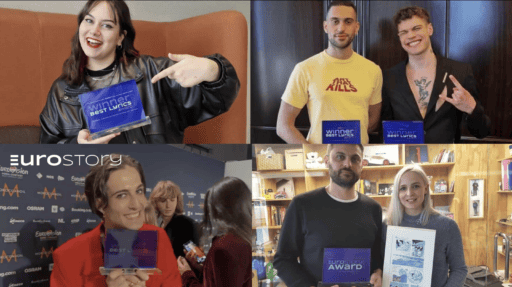
More information about previous winners of the Eurostory Best Lyrics Award:
